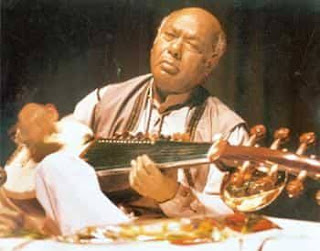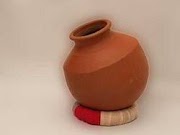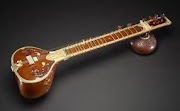Ustad Ali Akbar Khan
 |
| Ustad Ali Akbar Khan (born April 14, 1922- died June 18, 2009) |
His father Allauddin Khan sahib was the primary court musician for the Maharaja of a princely state named Maihar (now Madhya Pradesh, India). Soon after his birth, the family returned to Maihar.
Ali Akbar Khan received training from his father in various instruments as well as vocal composition from an early age ; but finally gravitated towards the sarode. Ali Akbar`s lessons started before dawn and often lasted 18 hours a day. Khansahib also learned to play the tabla and the pakhawaj from his uncle Aftabuddin Khan.
Ali Akbar Khan gave his debut performance at a music conference in Allahabad in 1936, at the age of 13. In 1938 he gave his first recital on All India Radio (AIR), Bombay (accompanied on the tabla by Alla Rakha), and starting in January 1940, he gave monthly performances on AIR, Lucknow. In 1944, he left Maihar to start his professional career, becoming the youngest Music Director for AIR, Lucknow.
In 1943, Ali Akbar Khan was appointed a court musician for the Maharaja of Jodhpur. There, he taught and composed music, besides giving recitals and was accorded the title of Ustad by the Maharaja. in 1947, he moved to Bombay when the princely states were abolished with India`s independence.
Ali Akbar Khan sahib first visited the United States in 1955 at the request of Yehudi Menuhin,and performed at the Museum of Modern Art in New York. Here he also made the first Western LP recording of Indian classical music and was the first to perform Indian music on US television.
He performed in India and traveled extensively in the West. Khan sahib founded the Ali Akbar College of Music in Kolkata in 1956. Later, recognising the extraordinary interest and abilities of his Western students, he began teaching in America in 1965. He founded another school of the same name in Berkeley, California in 1967 and later moved it to San Rafal, Switzerland, run by his discipel, California. In 1985, he also opened a branch of his college in Basele Ken Zuckerman, where he taught when on his world tours.
Khansahib had composed and recorded music for films throughout his career. He composed extensively in India beginning with `Aandhiyan` by Chetan Anand (1953) and went on to create music for `House Holder` by Ivory/Merchant (their first film), `Khudita Pashan` (or `Hungry Stone`) for which he won the `Best Musician of the Year` award, `Devi` by Satyajit Ray and in America, `Little Buddha` by Bernardo Bertolucci (1993).
Beginning in 1945, Ali Akbar Khan also started recording a series of 78 rpm disks at the HMV studios in Bombay. He created a new composition "Raga Chandranandan", based on four evening ragas namely Malkauns, Chandrakauns, Nandakauns and Kaunsi Kanhada.
He was awarded the Padma Bhushan in 1967 and Padma Vibhushan in 1989, as well as a plethora of other awards and honours. In 1997, He received the National Endowment for the Arts' prestigious National Heritage Fellowship, the United States` highest honour in the traditional arts, presented by Mrs. Hillary Clinton at a ceremony in the White House. This followed a MacArthur Genius Grant in 1991. He was nominated five times for the Grammy awards between 1970 and 1998.
Ali Akbar Khan was based in the United States for the last four decades of his life. At 87 years on, June 18, 2009, he passed away in San Francisco after a prolonged kidney ailment.



0 Comments